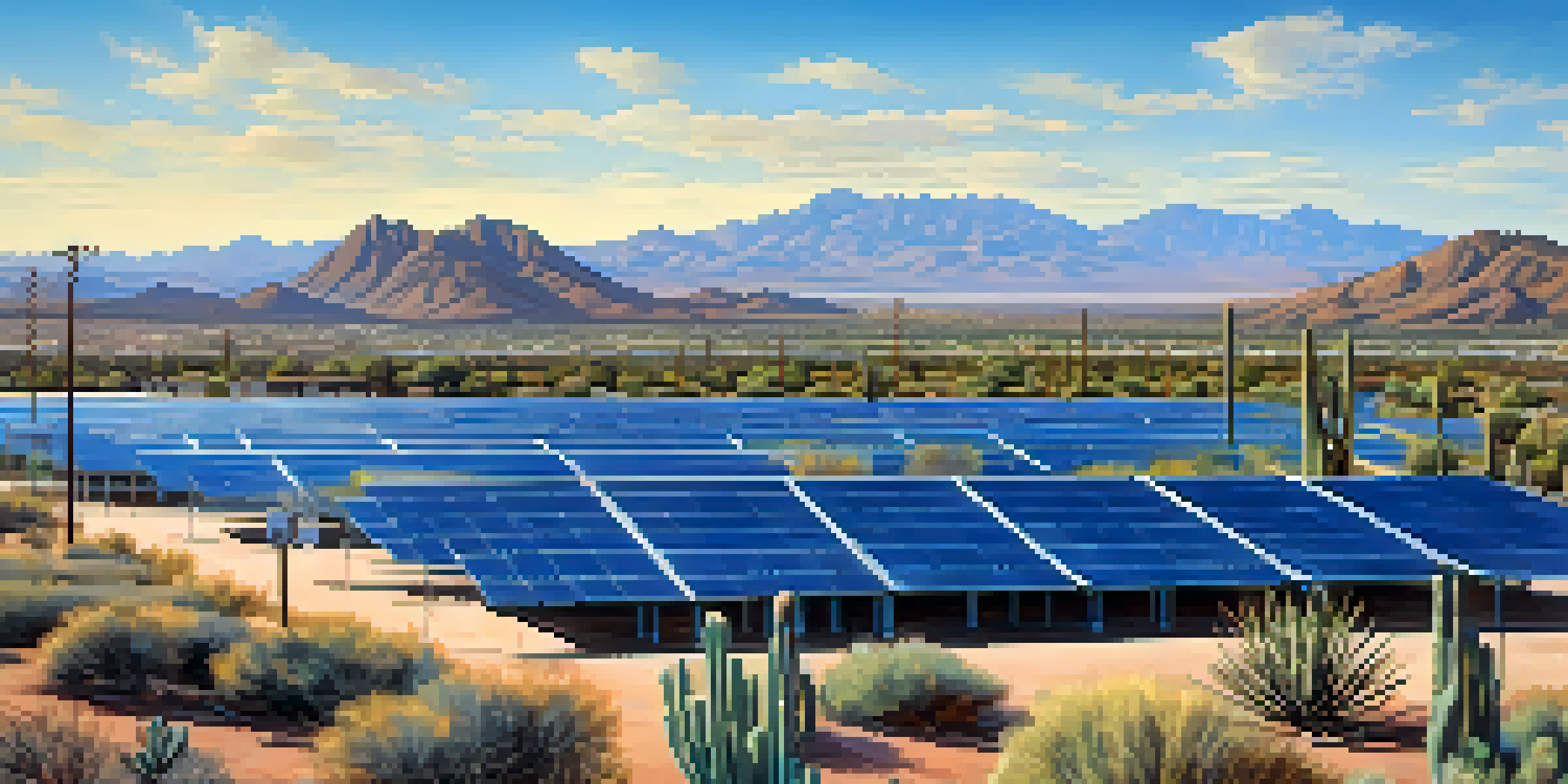Tucson's Solar Energy Initiatives for a Sustainable Future

Tucson's Commitment to Solar Energy Development
Tucson has made significant strides in solar energy development, establishing itself as a leader in sustainability. The city’s commitment to harnessing the power of the sun is evident through various initiatives that aim to reduce carbon footprints and promote clean energy. With abundant sunshine throughout the year, Tucson is in a prime position to capitalize on solar power, making it a vital component of its energy strategy.
The future will be green, or not at all.
The city government has launched programs to encourage both residential and commercial solar installations. These initiatives often include incentives such as tax credits and rebates, making solar energy more accessible to residents. By fostering a supportive environment for solar adoption, Tucson is not only promoting renewable energy but also stimulating the local economy.
Moreover, Tucson’s solar initiatives align with broader state and national goals for renewable energy. Such efforts not only benefit the environment but also help to create jobs in the green energy sector. As Tucson continues to invest in solar technology, it sets a powerful example for other cities looking to enhance their sustainability efforts.
Innovative Solar Programs in Tucson
One of the standout programs in Tucson is the Solar Zone, a dedicated area for solar energy research and development. Located at the University of Arizona, this zone serves as a testing ground for new solar technologies and applications. Researchers and students collaborate on projects that push the boundaries of solar efficiency, contributing to both academic knowledge and practical solutions.

In addition to the Solar Zone, Tucson has implemented community solar projects, which allow residents to benefit from solar energy even if they cannot install panels on their rooftops. These projects provide a shared solar installation, allowing participants to receive credits on their utility bills. This inclusive approach ensures that more residents can engage with solar energy, fostering a sense of community involvement.
Tucson Leads in Solar Energy Initiatives
Tucson is establishing itself as a leader in solar energy through various programs that promote sustainability and reduce carbon footprints.
Programs like these not only enhance energy access but also raise awareness about the importance of renewable energy. As Tucson invests in innovative solar initiatives, it cultivates a culture of sustainability that inspires other communities to follow suit.
Partnerships Boosting Solar Energy Efforts
Tucson has forged partnerships with various organizations to enhance its solar energy efforts. Collaborations with non-profits, educational institutions, and private companies have enabled the city to leverage resources and expertise. These partnerships often focus on research, development, and outreach, ensuring that solar energy reaches a wider audience.
Renewable energy is not a thing of the future; it is a thing of the present.
For instance, local utilities work hand-in-hand with the city to develop programs that support residential solar installations. These partnerships help streamline the installation process and provide residents with the information they need to make informed decisions. By combining efforts, Tucson is creating a robust solar ecosystem that benefits everyone involved.
Furthermore, these collaborative efforts often lead to innovative solutions that address common barriers to solar adoption, such as financing and accessibility. By working together, Tucson and its partners are setting the stage for a more sustainable and energy-efficient future.
Tucson's Solar Energy Education and Outreach
Education and outreach are crucial components of Tucson's solar energy initiatives. The city hosts workshops and seminars that aim to inform residents about the benefits of solar energy and the options available to them. These sessions often cover topics like the installation process, financing options, and the environmental impact of solar energy.
In schools, programs are implemented to teach students about renewable energy and its importance in combatting climate change. By integrating solar energy into the curriculum, Tucson is nurturing a generation that values sustainability and is more likely to advocate for renewable energy solutions in the future. This educational approach not only empowers individuals but also fosters a community that is informed about energy choices.
Community Engagement in Solar Projects
Innovative community solar projects and education efforts are ensuring that more residents can access and benefit from solar energy.
Additionally, community events often feature solar demonstrations and informational booths, making it easy for residents to engage with solar technology. Through these efforts, Tucson is not just promoting solar energy; it’s building a culture of sustainability that extends beyond individual actions.
The Role of Local Government in Solar Initiatives
The local government plays a pivotal role in Tucson's solar energy initiatives. Through policy-making and strategic planning, city officials have prioritized renewable energy as a vital aspect of Tucson's growth. This commitment is reflected in policies that support solar installation and emphasize energy efficiency across various sectors.
Moreover, the city has invested in solar projects for municipal buildings, showcasing a commitment to sustainability at all levels of government. By leading by example, Tucson not only reduces its operational costs but also sets a benchmark for private entities and residents to follow. This proactive approach creates a ripple effect that encourages wider community participation in solar energy.
Local government efforts also extend to regulatory frameworks that simplify the permitting process for solar installations. By removing bureaucratic hurdles, Tucson is making it easier for residents and businesses to adopt solar energy, ensuring that the transition to renewable sources is as smooth as possible.
Challenges Facing Solar Energy in Tucson
Despite the progress made, Tucson's solar energy initiatives do face several challenges. One major hurdle is the initial cost of solar installation, which can be prohibitive for low-income households. While incentives and financing options help, there is still a need for more accessible solutions that ensure everyone can benefit from solar energy.
Additionally, the variability of solar power generation presents challenges for managing energy supply. Tucson must invest in energy storage solutions and smart grid technology to ensure that solar energy can be effectively integrated into the existing energy system. This requires ongoing innovation and collaboration between various stakeholders.
Local Government's Role in Solar Growth
The local government's strategic planning and supportive policies are crucial in facilitating solar installations and fostering a culture of sustainability.
Finally, public perception and awareness about solar energy can also pose challenges. Some residents may still be hesitant to embrace solar technology due to misinformation or a lack of understanding. Addressing these concerns through education and outreach is essential for overcoming barriers and maximizing solar adoption in Tucson.
Future Prospects for Solar Energy in Tucson
Looking ahead, the future of solar energy in Tucson appears bright. As technology continues to advance, we can expect improvements in solar panel efficiency and affordability, making solar energy an even more attractive option for residents. Innovations in battery storage will also play a critical role in ensuring a consistent energy supply, regardless of weather conditions.
Furthermore, Tucson's ongoing commitment to sustainability and renewable energy is likely to attract more investment in solar projects. This influx of resources can lead to new jobs and economic opportunities within the green energy sector, benefiting the community as a whole. Such developments not only contribute to local prosperity but also enhance Tucson's reputation as a leader in solar energy.

As Tucson continues to prioritize solar energy initiatives, it stands as a model for other cities aiming to enhance their sustainability efforts. With strong community support, forward-thinking policies, and innovative partnerships, Tucson is well on its way to achieving a sustainable and solar-powered future.